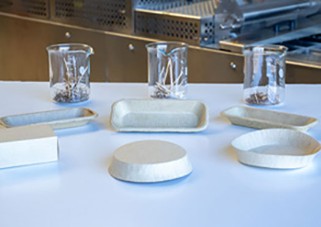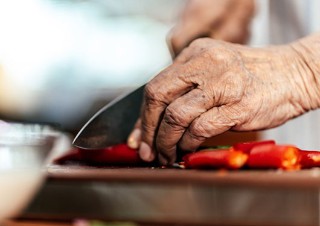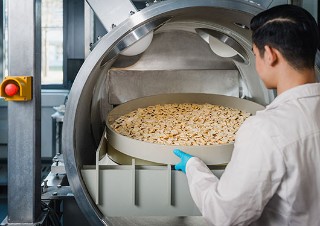Freshness, quality and sustainability are what today’s consumers expect from food products. And for highly perishable items, shelf life plays a crucial role. To extend it, preservatives are often used – yet the demand for natural ingredients and clean-label products continues to grow.
In the "PEARL" research project, we are working together with international partners to develop innovative processes to keep food fresh for longer in a natural way. The focus is on phlorotannin-rich extracts from cultivated macroalgae – bioactive compounds with antimicrobial and antioxidant effects.
Macroalgae are also a particularly sustainable raw material: they require neither agricultural land nor fertilizer. At Fraunhofer IVV, we examine the effectiveness of these extracts and evaluate their practical suitability for industrial applications.
Would you like to improve the shelf life of your products and open up new business opportunities? Get in touch with us – we are here to support you.
News
-

-

Lithium-ion batteries are a key technology for electromobility and energy storage. Their aluminum encapsulation is lightweight and easy to process, but offers limited safety: severe overheating can lead to temperatures at which the aluminum shell itself catches fire – a fire that is difficult to extinguish.
more info
In an international research project, we are therefore developing a new generation of lithium-ion battery casings together with industrial partners from South Korea and the Fraunhofer ISC. Our approach: stainless steel combined with a high-barrier composite material for improved fire protection, high chemical resistance and a longer service life. In this way, we create a significantly more robust and safer solution for demanding applications.
We also build on this expertise to create your individual solutions: Whether corrosion protection, gas or water vapor barrier, improvement of mechanical stability or electrical insulation – we functionalize polymer and metal surfaces effectively and over a large area, precisely tailored to your overall system.
Do you have any questions or are you interested in details? Contact us – we look forward to exchanging ideas. -

Reliably sealed packaging is a key lever for preventing food and resource waste – especially in the case of flexible plastics and coated papers that are to be used in compliance with the PPWR in the future. This is precisely where our new joint research project with the University of Hasselt (Belgium) comes in.
more info
The aim is to investigate how material properties and melt flow behavior during heat contact sealing influence seam tightness and how sealing parameters (e.g. temperature, time, pressure, cooling) can be optimally adapted to this.
We would like to involve companies and experts from industry in the project at an early stage – from raw material manufacturers and packaging producers to food processors. Their experiences and needs will help us to sharpen the research focus in a practical way. We look forward to your input on our survey. -

The demands placed on modern lubricants are increasing – as is awareness of their impact on the environment. Conventional, mineral oil-based products are efficient, but pose ecological challenges. A large proportion ends up in the environment due to leaks or improper disposal.
more info
Water-based lubricants represent a sustainable and cost-effective alternative. In the IGF research project "TriPoly", we are therefore developing water-based lubricant systems with a water content of over 50%. The challenge lies in the water itself: It offers good cooling performance, but has weaknesses in terms of viscosity, corrosion protection and microbiological stability. To compensate for these deficits, we use modified, bio-based polymer additives. Thanks to their natural, friction-reducing properties, they can reduce the use of conventional additives and increase performance at the same time. Mineral oil and glycols are completely avoided.
Would you like to experience the development at first hand? Then we would like to invite you to join the project committee. Please feel free to contact us. -

The automated production of food, non-food and healthcare products places high demands on systems, personnel and the entire value chain. At the same time, legal reporting obligations are increasing, for example as a result of the Corporate Sustainability Reporting Directive (CSRD).
more info
With our data-based machine analyses, the system efficiency and resource consumption of production and cleaning processes can be recorded and documented on a time, product and machine-specific basis and optimization potential can be identified. The focus is on a holistic view of the processes and the interaction between humans and machines. In particular, time and quantity recording at overall plant level makes it possible to view all process steps in context.
With our "VERA" data acquisition system, we collect synchronized sensor data in high resolution, analyze downtimes, determine availability and efficiency and thus create the basis for increasing overall equipment efficiency (OEE) and resource efficiency.
"VERA" also records energy and media consumption on a plant-specific basis in various operating states – ideal for audits, life cycle analyses (LCA) or targeted efficiency optimizations. The visual documentation supports logging and makes processes clear.
Our analyses provide objective, comprehensible data as a neutral basis for decision-making. Take advantage of our many years of experience in process and machine analyses for your production processes. Get in touch with us! -

The EU Nature Restoration Law poses major challenges for many farmers - but also opens up new income opportunities. One promising option is the use of paludicultures, i.e. moorland plants such as peat moss, reeds or reed canary grass, which can be cultivated on the rewetted areas. In the "Paludi" project, we are researching how paludicultures can be used as an alternative to wood pulp for sustainable packaging solutions.
more info
Our focus is on the presentation of a decentralized value chain. Among other things, we have developed a soda pulping process that requires 45% lower temperatures and 11% less chemicals than conventional paper production processes. In addition, we were able to use fiber casting to produce packaging made from 100% reed, which has better properties than standard packaging on the market. This enabled us to demonstrate the potential of paludicultures as a sustainable raw material for fiber-based packaging solutions. The advantages: Saving resources, positive climate effects and reducing dependence on raw material imports by using regional peat plants.
You can find out more about the project at Agritechnica from November 9 to 15, 2025 in Hanover, Hall 17 / Stand 17B15. -

Proper nutrition is a key to enjoying life and dignity in old age. Medical and sanitary progress has led to a significant increase in the average age of the population. However, this does not automatically mean healthy ageing. This is because many people suffer from a lack of appetite in old age, which leads to malnutrition and has serious consequences for their quality of life.
more info
In the European research project "APPETITE", which was founded as part of the Joint Programming Initiative "Healthy Diet for Healthy Living", eight institutes from six countries worked together to design a diet that meets the special needs of older people with a poor appetite. The development work focused not only on the supply of high-quality proteins and fiber, but also on adapting the taste, texture and acceptance of the products. In addition, appetite was to be increased through a targeted increase in activity.
We welcome you to attend the final webinar on November 13, 2025, from 9 am to 1 pm (CET). Experience how science and practical application come together to sustainably improve the nutrition of older people.
Among other things, you can expect:
- Insights into the reality of life for older people with loss of appetite
- New product solutions with optimized amino acid composition
- Results of the international intervention study on muscle and metabolic health
- Inspiration for developing your own products for an ageing society
Register now - we look forward to your participation! -

Over 4 million tons of cocoa are harvested worldwide every year, but only the beans end up in chocolate. The surrounding pulp, a fruity by-product with an intense aroma of lychee, mango and citrus, has so far remained largely unused. It not only offers exciting flavor components, but also functional ingredients such as fiber, magnesium and potassium.
more info
In the international Cornet project "CocoaFerm", we are working with partners to develop the pulp for the food and flavor industry. Our researchers are developing processes to preserve the sensitive fruit. In addition to fermentation, special drying processes such as microwave vacuum expansion or foam mat drying are also being used. Together with the Fraunhofer IME, the resulting ingredients are tested for their safety for food use in beverages such as kombucha or ginger beer, snacks and flavors.
Would you like to experience first-hand how sustainability tastes and are you interested in the potential of pulp for your product range? Then we cordially invite you to the project meeting with a tasting on November 24, 2025, at 12 pm at the Fraunhofer IME in Giessen. Experience the sensory diversity of cocoa pulp and discuss further possible applications with us. Dr. Isabell Rothkopf will be available to answer any questions you may have about the project or the event. -

Modern vehicles and mobile machines use many highly developed sensors. The functional reliability of these systems depends crucially on the quality of the sensor data. Contamination or deposits such as ice and snow on the sensor surfaces can significantly impair their performance - a risk for driver assistance and autonomous driving.
more info
Our solution: customized, integrable cleaning solutions for sensors, known as sensor cleaning systems or clear vision systems. Thanks to our interdisciplinary expertise in cleaning technology, sensor technology, machine and process development and state-of-the-art testing facilities, we offer comprehensive support in the development, analysis and optimization of tailor-made cleaning solutions for sensors. Our range of services extends from the targeted optimization of cleaning processes to precise systems for contamination detection and validation under realistic conditions. We always pay attention to resource-saving and needs-based cleaning that adapts flexibly to the actual degree of contamination.
If you would like to find out more about our research results and technology solutions in the field of industrial cleaning and exchange ideas with us and other industry experts, we invite you to join our LinkedIn group #IndustrialCleaningTechnologies. -

The new EU Packaging and Packaging Waste Regulation (PPWR) has been in effect since February 2025. It has been designed to promote the transition to a genuine circular economy in the packaging sector. But what does this mean in concrete terms for materials in the recycling process - especially when they are processed into new packaging materials? And are their mechanical properties retained?
more info
In our packaging pilot plant, we simulate the multi-recycling process using our compounder. We then process the material into films on our co-extrusion pilot line. In our test laboratory, the change in key properties such as tensile strength, puncture resistance, permeation and sealability are analyzed.
We will be happy to support you in solving your individual challenges with the diverse possibilities of our pilot plant. Get in touch with Swantje Eissing and find out more about the services you can book with us.
Would you like to know how your own materials perform after recycling? Or which adjustments need to be made to your machinery in order to process recycled plastics efficiently? Then visit us at FachPack on September 23, 2025 in Hall 4, Stand 4-209, PackBox! Our scientific experts will be there from 2 to 3 p.m. to present the latest research results and development opportunities in the field of packaging materials. The presentations will be held in German.
 Fraunhofer Institute for Process Engineering and Packaging IVV
Fraunhofer Institute for Process Engineering and Packaging IVV